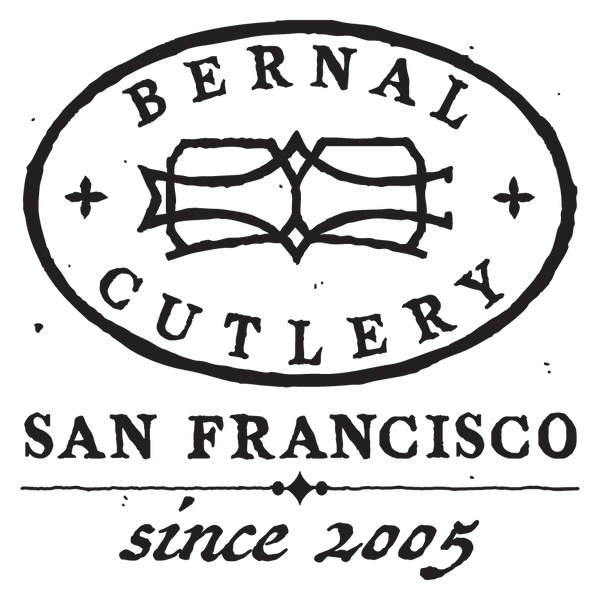-
Currency
-
NEW
- All New Products
- New Kitchen Knives
- New Kitchen Tools
- Latest Vintage
- New Pocket & Outdoor
- New Pantry
-
What's in my Basket Series
- Nite Yun - Lunette
- Scott & Frost Clark - Dad's Luncheonette, Chef & Author
- Angela Wilson - Avedano's
- Susan Kim - Eat Doshi
- Seth Stowaway - Osito
- Dr. Harold McGee - Author
- Ryo Sakai -Kuma Sushi
- Ian McNemar - Woodworker, Instructor
- Anna Voloshyna - Author
- Jorge Martinex Lillard - Lolo´
- Chris Yang - Piglet & Co
- Griffin Wilson - @cabincorn
- Gabe Rudolph - Gestura Utensils
- Molly DeCoudreaux - Food Photographer
- Geoff Davis - Burdell Soul Food
- Jen and Wes - @crazythickasians
- Josh Donald - Bernal Cutlery
- Kelly Kozak - Bernal Cutlery
- Jessica Sullivan - Poppy SF
- Sylvan Mishima Brackett - Rintaro
- Michael Myers - Film Character
- Ali Hooke - @alihooke
- Bruce Hill - The Chef's Press
- Dylan Carasco - Butcher's Guide
- Spencer Horowitz - Hadeem
-
Japanese Knives
- Ashi Hamono
- Gihei Knives
- Godo Tadaharu
- Hatsukokoro
- Hitohira
- Iwasaki Kamisori
- Kaji-Bei
- Kamo Shiro
- Kanehide
- Konosuke
- MAC Knife
- Masakane
- Makoto Tadokoro Marushin
- Morihei
- Myojin Riki Sesakusho
- Nakagawa Hamono
- Naozumi
- Nigara Hamono
- Sakai Kikumori
- Shigefusa
- Tagai
- Takada no Hamono
- Tanabe Tatara
- Tosa
- Tsukasa Hinoura
- Yoshikane
- Yoshikazu Tanaka
- Wakui
-
Global Knives
- Allday Goods (GBR)
- Alma Knife Co. (USA)
- Astral Works (USA)
- Au Sabot (FRA)
- AZ Knives (ARG)
- Benchmade Cutlery (USA)
- Bernal Cutlery (USA)
- Blenheim Forge (GBR)
- Chazeau Honoré (FRA)
- Dexter Russell (USA)
- Eichenlaub Tableware (DEU)
- Florentine Kitchen Knives (ESP)
- Fontenille Pataud (FRA)
- Friedr Herder (DEU)
- J Adams (GBR)
- John Nowill & Son (GBR)
- K Sabatier (FRA)
- Pallares (ESP)
- Roland Lannier (FRA)
- Rolin Knives (USA)
- Silverthorn (USA)
- Steelport Knife Co. (USA)
- Windmühlenmesser (DEU)
- Zirh (TUR)
-
Pocket | Outdoor
- A Wright & Son (GBR)
- Andersson & Copra (SWE)
- Au Sabot Folders (FRA)
- Benchmade (USA)
- Buck Knives (USA)
- David Margrita (FRA)
- Friedr Herder (DEU)
- Fontenille Pataud (FRA)
- Helle (NOR)
- Higonokami
- Hults Bruk Axes (SWE)
- Ibberson (GBR)
- Joseph Rogers & Sons (GBR)
- Kalthoff Axes (SWE)
- MOKI Knives (JPN)
- Morakniv (SWE)
- Opinel (FRA)
- Pallares (ESP)
- Tactile Knife Company (USA)
- Wood Tools (GBR)
- Vintage & New Vintage
-
Styles
- Bernal Cutlery Collaborations
- Knife Sets
- Carving Forks | Knives | Sets
- Japanese Kitchen Knives
- Western Kitchen Knives
- Chinese Style Cleavers
- Bread
- Butchery
- Cheese | Charcuterie
- Pocket | Folding
- Woodworking | Hobby | Craft
- Kamisori Razors
- Table | Steak
- Fixed Blades | Axes | Outdoor Tools
- Scissors | Shears | Snips
- Left Handed
- The Vault
- Vintage
- Sharpening
- Kitchen | Cookware
- Tableware | Service
- Pantry
- Accessories
- Deals
- Gift Cards
- INFO
or
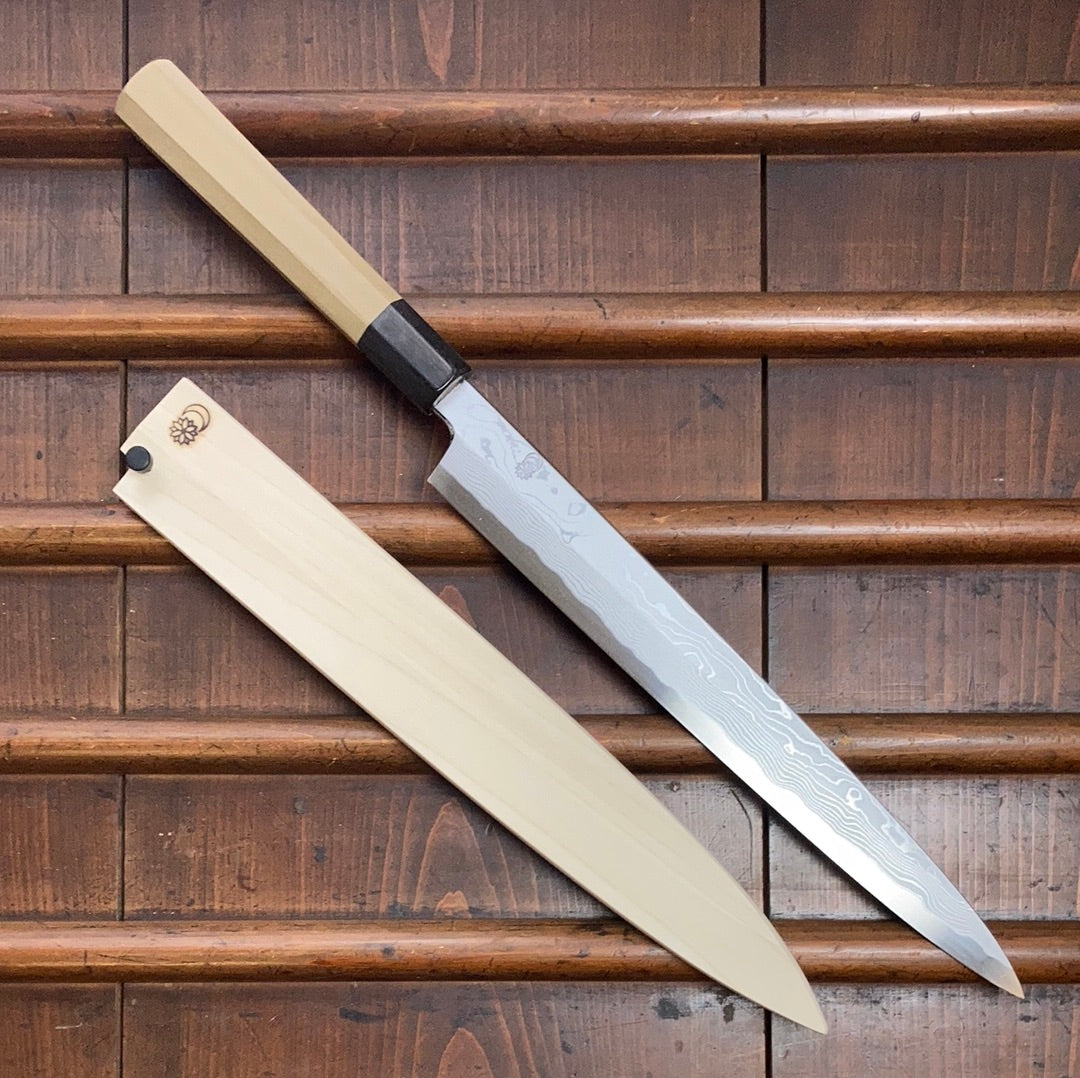
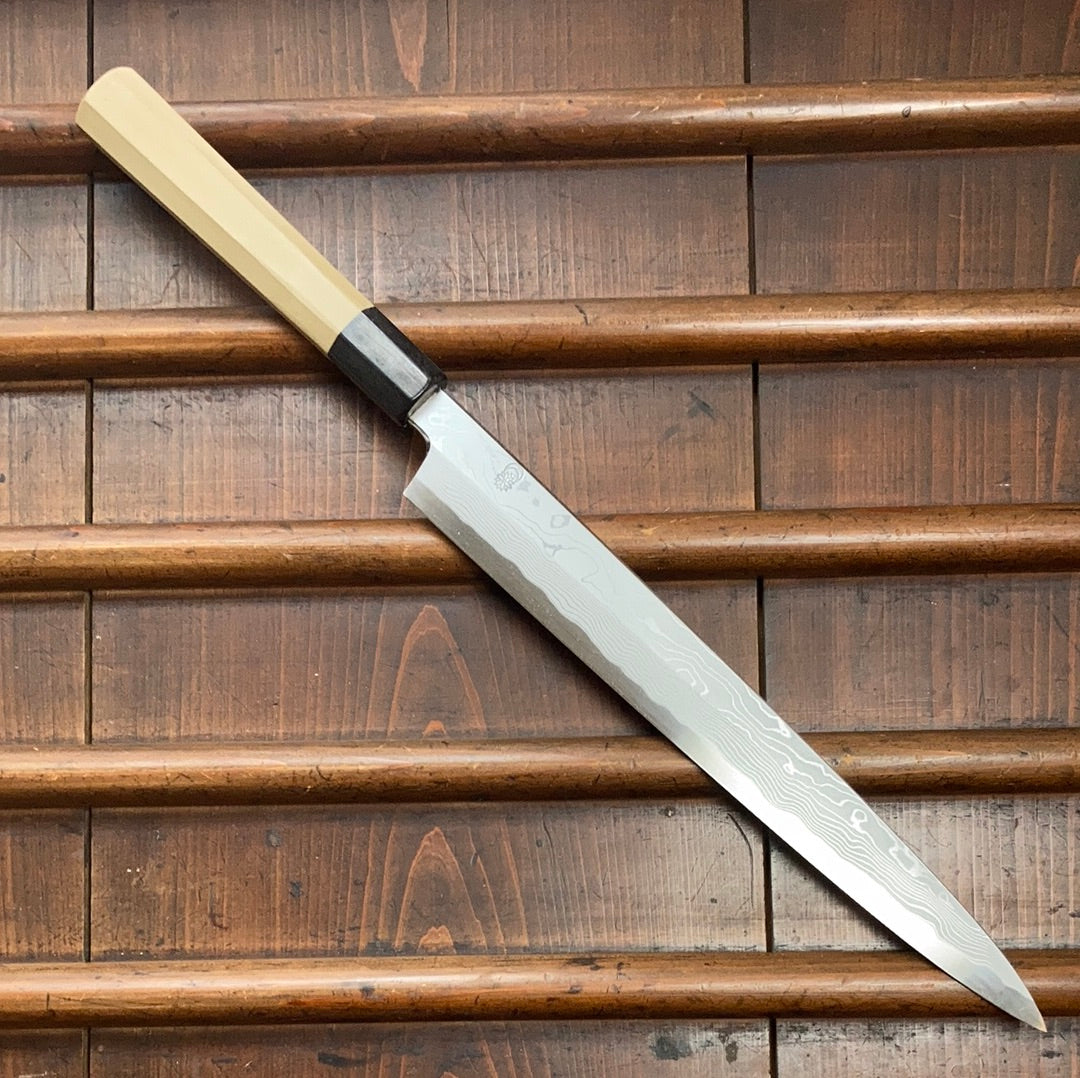
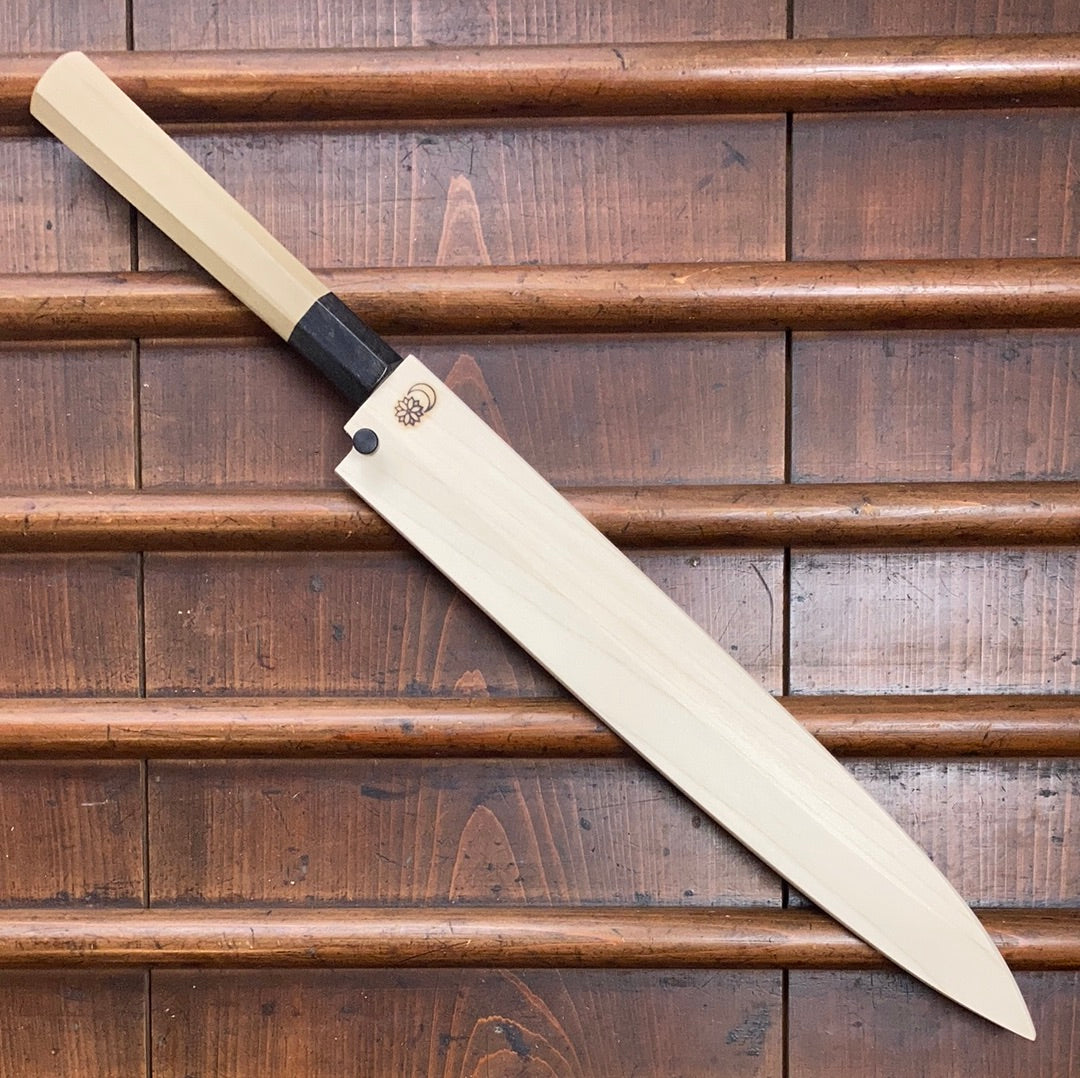
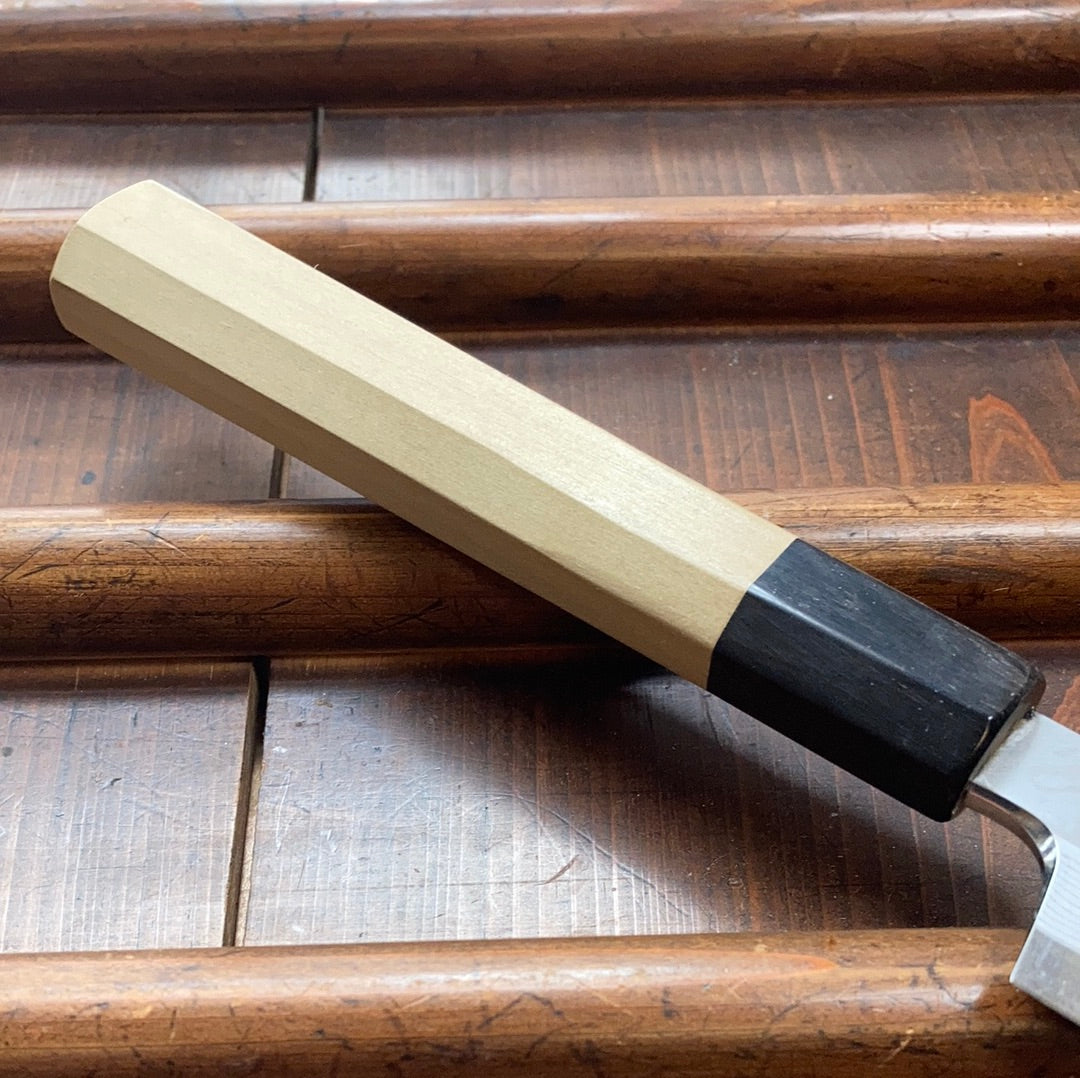
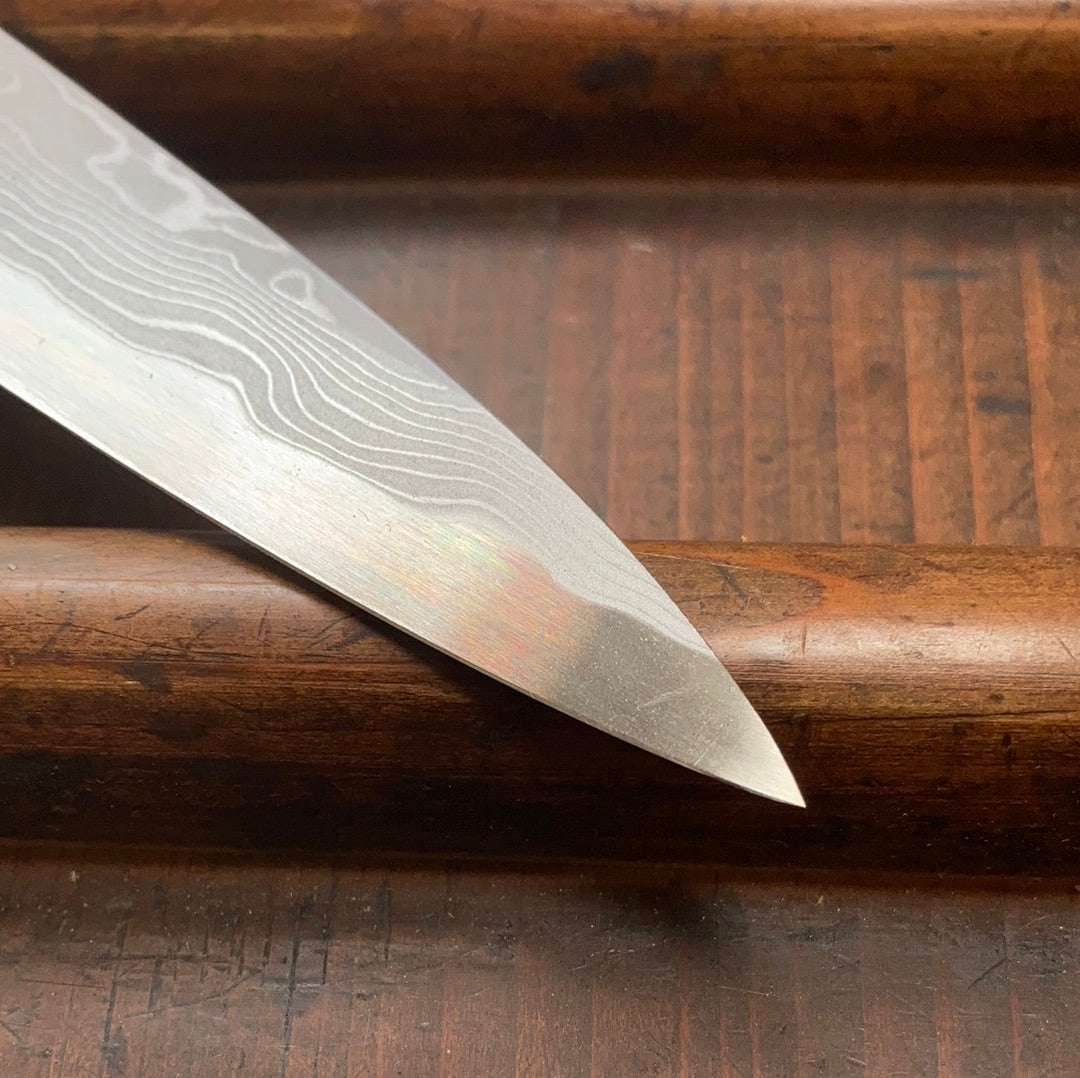
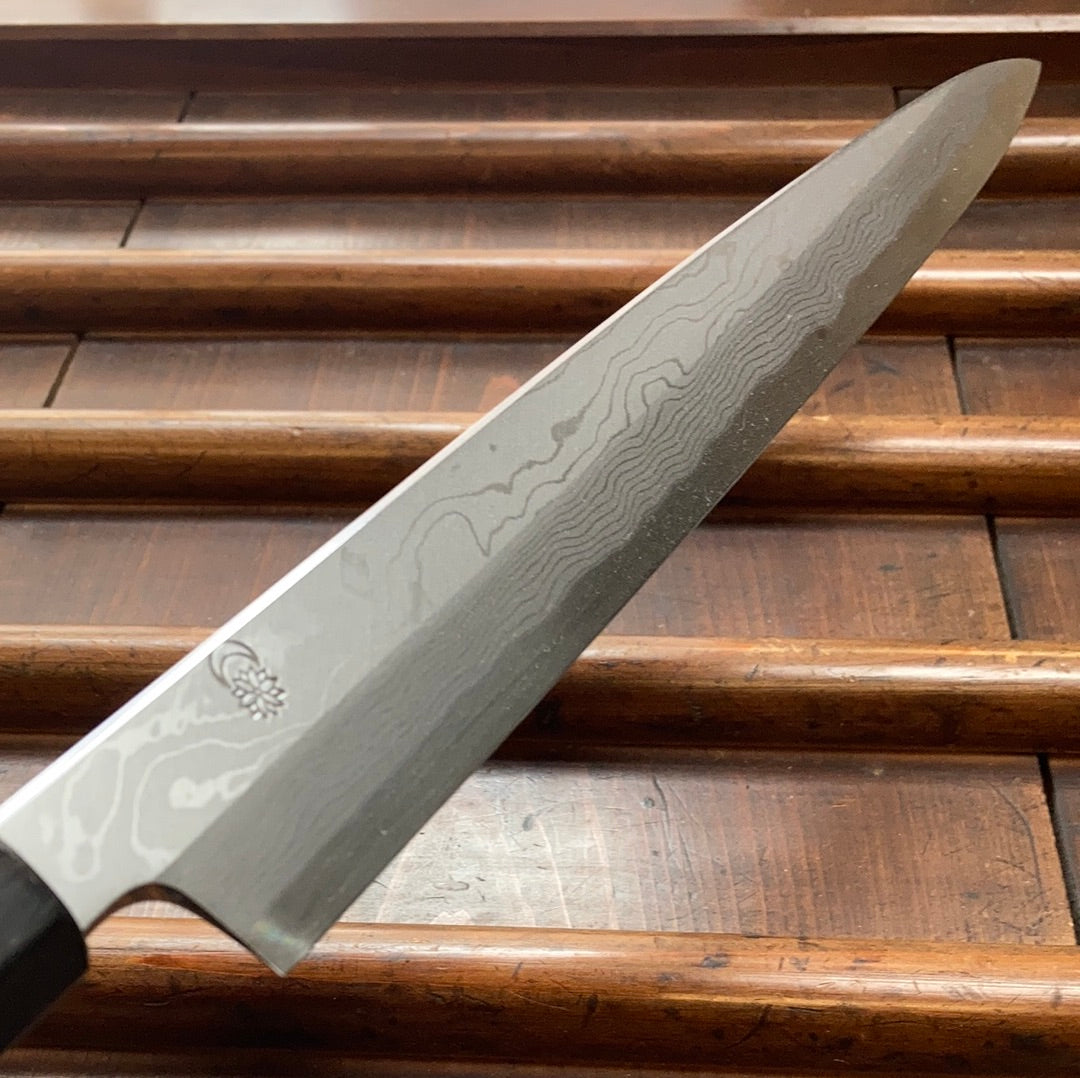
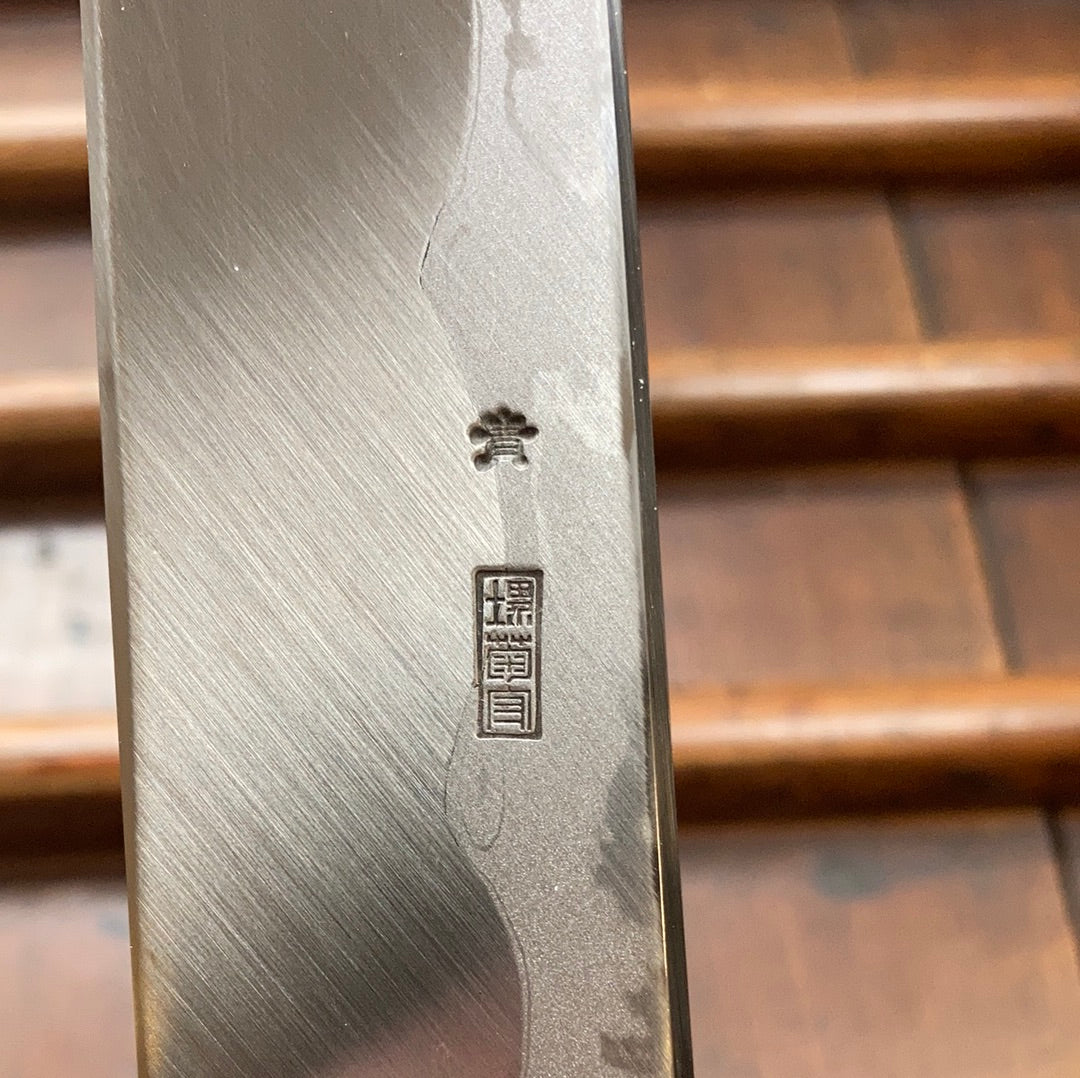
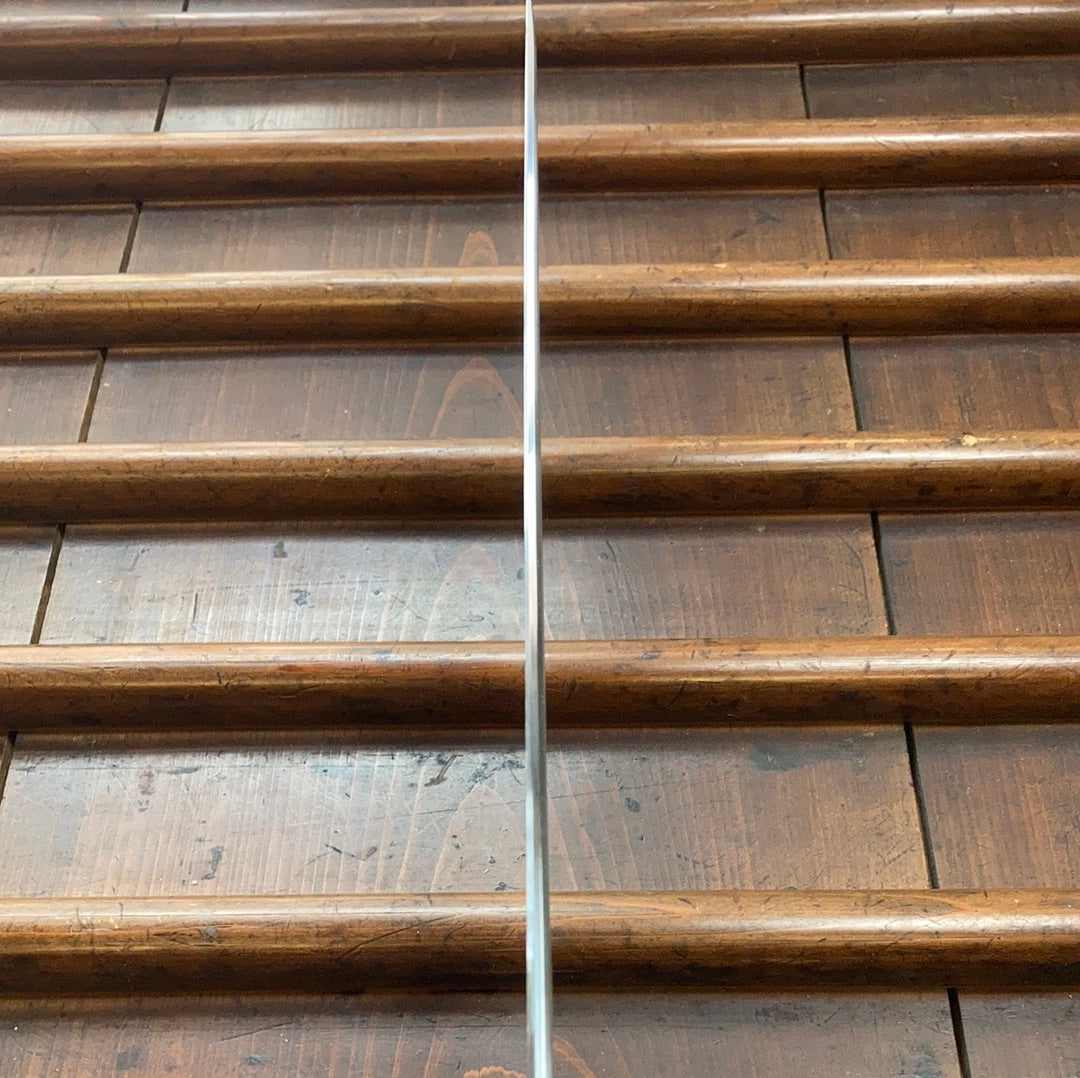
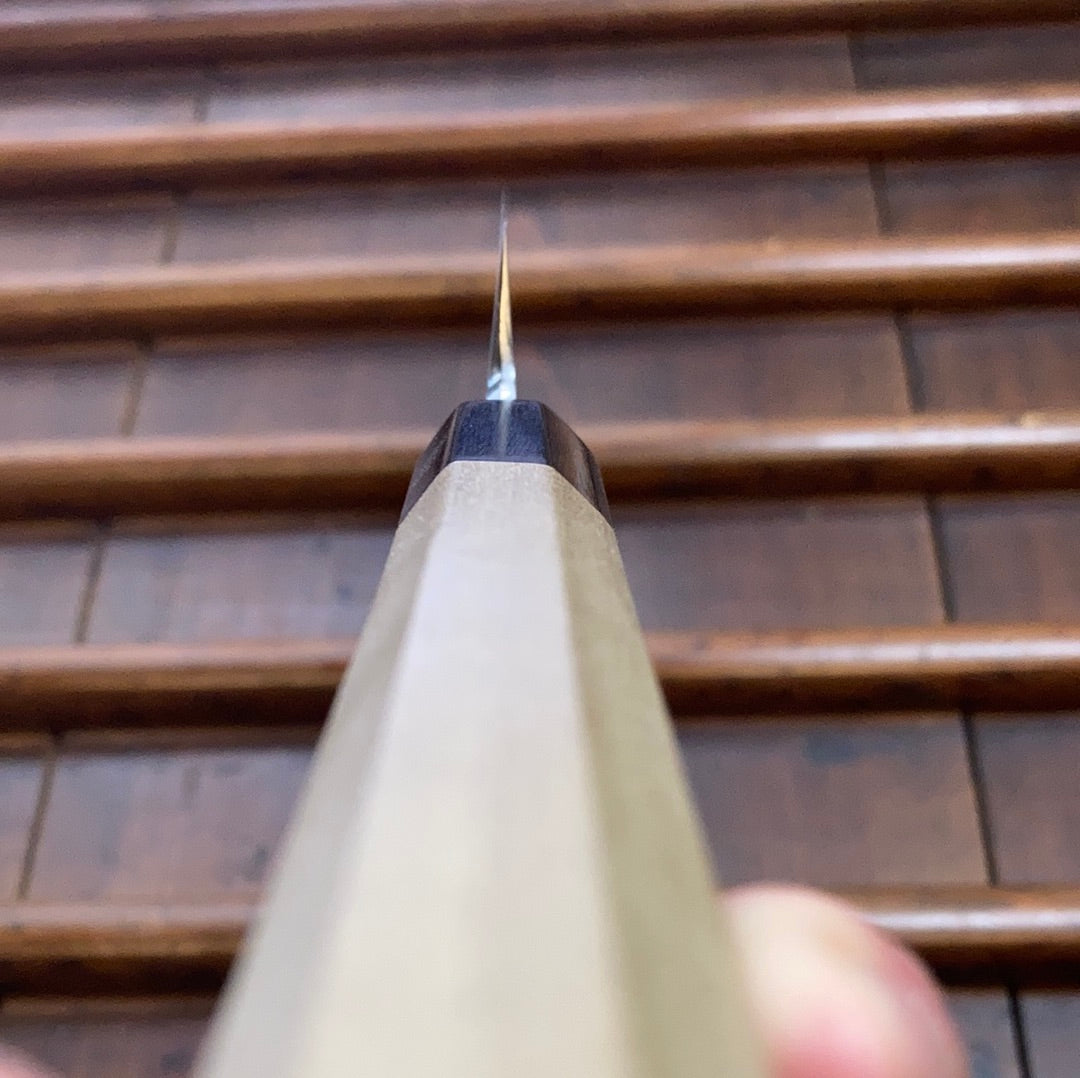
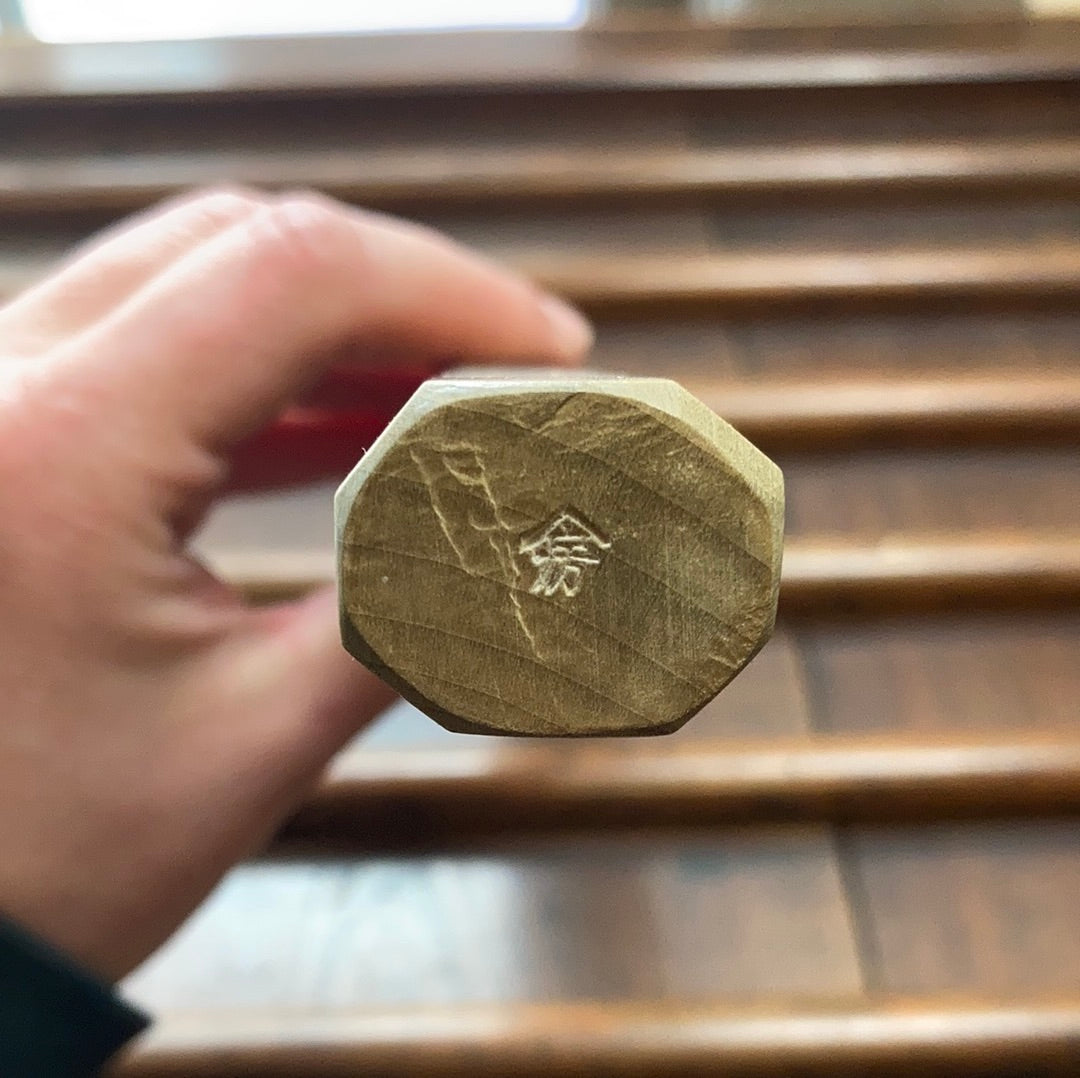
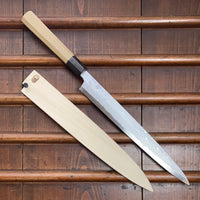
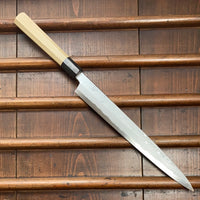
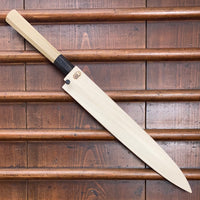
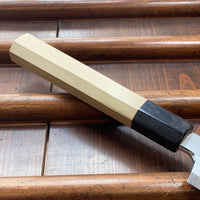
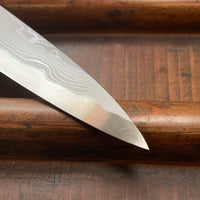
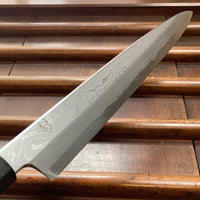
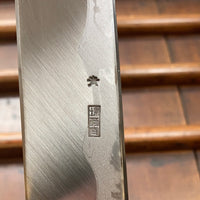
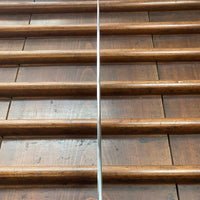
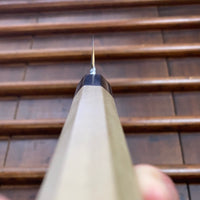
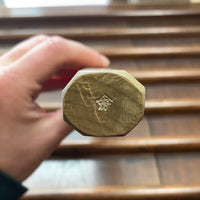
Sakai Kikumori Kikuzuki Uzu 270mm Yanagi Aogami 1 wth Saya
-
Regular Price
-
£446.33
-
Sale Price
-
£446.33
-
Regular Price
-
Sale
Sold Out
-
Unit Price
- /per
- Regular Price
- £446.33
- Sale Price
- £446.33
- Regular Price
- Unit Price
- /per
Sakai Kikumori Kikuzuki Uzu’ 270mm Yanagi. Single bevel aogami #1 core blade with damascus iron cladding. Octagonal magnolia wood and water buffalo ferrule handle. Comes with saya.
Kikuzuki series knives represent some of the best of Sakai’s knife making. Made by craftspeople who are well respected for preserving demanding traditional techniques, they also contribute their own refinements and creativity to the craft.
These have a light blade with a thin, low beveled kireba on the single beveled line. Yanagis — that usually rely on weight to help propel a pull cut — slice just as easily as heavier ones.
Kikuzuki Uzu, Kuro, and Kasumi blacksmiths are from Tanaka Hamono. Tanaka-san’s top level forging and heat treatments make for an unusual ease of sharpening and superb edge life and toughness.
This knife has a hard carbon steel core with iron cladding for added durability. The entire blade will develop a patina with use, especially with acidic foods. Special attention is needed to keep from rusting. Do not leave wet. Hand wash & dry, no dishwasher. Hardwood-end grain or softwood long grain cutting boards are preferred; avoid bamboo and plastic cutting boards. Rust can be removed with a light abrasive.
Sakai Kikumori was started in 1926 and draws on Sakai's 600 year history as the major center of traditional Japanese cutlery manufacturing. They work with a large variety of Sakai's best smiths, sharpeners and small factories to offer a wide variety of knives ranging from traditional to modern.
| Steel Type | Aogami 1 |
| Handle Material | Ho Wood Octagonal |
| Weight | 151.6 grams |
| Height at Heel | 34 mm |
| Overall Length | 512 mm |
| Cutting Edge Length | 261 mm |
| HRC | 63-64 |
This is a carbon steel knife. Carbon steel is expected to develop a dark patina with use. It needs to be hand washed and dried immediately after use. Do not air dry. Do not put it in the dishwasher. Long exposure to moisture and debris will result in rust. Any rust development should be removed with a light abrasive.
Twisting, scraping, and heavy use, as well as use on hard and very dense objects can lead to edge damage. Use on a quality wooden cutting board will help the knife stay sharper for longer. Use on hard surfaces like plates and bamboo will reduce the edge life and can result in edge damage. Special attention needs to be taken to prevent edge damage. Scraping, twisting and forceful as well as using on hard or very dense foods can result in chipping.
We recommend hand sharpening on whetstones. We have found that most Japanese knives perform best at a finer finish starting around 4000. Avoid pull through sharpeners and non-water cooled mechanized sharpening. Ceramic honing rods are preferred.
Recently Viewed
About Bernal Cutlery
We are a full-service cutlery shop offering sharpening services, Japanese and Western culinary knives, vintage knives, outdoor, pocket and craft knives, cooking tools and accessories. We also offer knife skills and sharpening classes, and more.
We are proud to serve kitchen professionals, knife enthusiasts and home cooks alike. Located in the Mission District of San Francisco, California.
766 Valencia Street, SF, CA 94110
1 Ferry Building, Ste. 26, SF, CA 94110
